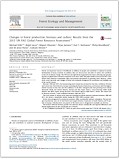| Journal Article |
 |
|
| Article Title | Changes in forest production, biomass and carbon: Results from the 2015 UN FAO Global Forest Resource Assessment | | Author | Michael Köhl, Rodel D. Lasco, Miguel Cifuentes, Orjan Jonsson, Kari T. Korhonen, Philip Mundhenk and Jose de Jesus Navar | | Year | 2015 | | Journal Title | Forest Ecology and Management | | Institution | Elsevier B.V. | | Volume | 352 | | Pages | 21-34 | | Call Number | JA0657-16 | | Keywords | Forest Resources Assessment 2015, Removals, Wood fuel, Production area, Carbon, Growing stock |
|
| Abstract: |
| The Indonesian government recently confirmed its Intended Nationally Determined Contributions (INDCs) to mitigate global climate change. A forest moratorium policy that protects forest and peatland is a significant part of the INDCs; however, its effectiveness is unclear in the face of complex land-use and land-cover change. This study aims to assess the dynamics of land-use change and ecosystem service supply as a function of local decision- making. We developed an agent-based model, Land-Use Change and Ecosystem Services (LUCES), and used it to explore the possible effects of the forest moratorium policy on the land-use decisions of private companies and communities. Our simulations for two districts in Central Kalimantan show that the current implementation of the forest moratorium policy is not effective in reducing forest conversion and carbon emissions. This is because companies continue to invest in converting secondary forest on mineral soils and the moratorium does not affect community decision-making. A policy that combines a forest moratorium with liveli- hood support and increases farm-gate prices of forest and agroforestry products could increase the local communities ’ benefits from conservation. Forest and agroforestry areas that are profitable and competitive are more likely to be conserved and reduce potential carbon emission by about 36 %. The results for the two districts, with different pressures on local resources, suggest that appropriate additional measures require local fine-tuning. The LUCES model could be an ex ante tool to facilitate such fine-tuning and help the Indonesian government achieve its INDC goals as part of a wider sustainable development policy. |
|